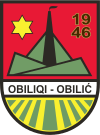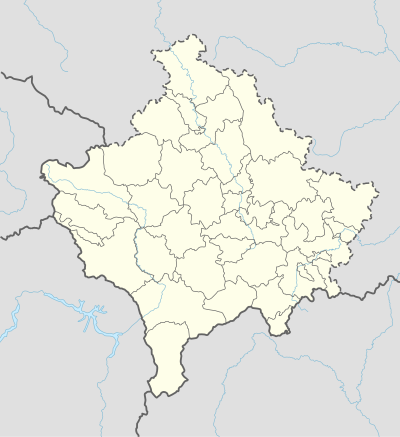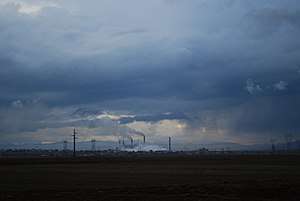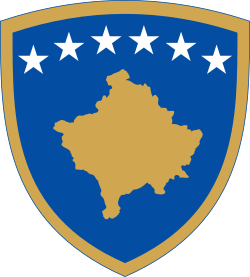Obilić
Obilić (Serbian Cyrillic: Обилић), or Obiliq or Kastriot (Albanian: Obiliqi or Kastrioti), is a town and municipality located in the Pristina District of Kosovo[lower-alpha 1]. According to the 2011 census, the town of Obilić has 6,864 inhabitants, while the municipality has 21,549 inhabitants. The municipality includes the town of Obilić and 19 villages.[1]
Obilić | |
|---|---|
Town and municipality | |
Obilić main street | |
 Emblem | |
 Obilić Location of the municipality of Obilić within Kosovo | |
| Coordinates: 42°41′N 21°04′E | |
| Country | Kosovo[lower-alpha 1] |
| District | District of Pristina |
| Municipality | 1989 |
| Government | |
| • Mayor | Xhafer Gashi |
| • Municipal | 105 km2 (41 sq mi) |
| Elevation | 526 m (1,726 ft) |
| Population (2011) | |
| • Urban | 6,864 |
| • Municipal | 21,549 |
| • Municipal density | 210/km2 (530/sq mi) |
| Time zone | UTC+1 (CET) |
| • Summer (DST) | UTC+2 (CEST) |
| Postal code | 15000 |
| Area code(s) | +383 38 |
| Car plates | 01 |
| Website | kk |
The municipality is located immediately north-west of Pristina on the main road to Mitrovica. It was created in 1989, prior to which it formed part of Pristina municipality.[1]
Name
Prior to the Balkan Wars (1912-1913), the settlement was known as Globoderica (Глободерица).[2]
Following the conflict, the settlement was incorporated into Serbia and renamed Obilić as part of the Serbianisation efforts of the early twentieth century when inhabited places within Kosovo were named after heroes from Serbian epic poetry.[2][3] The placename Obilić refers to the Serbian national hero Miloš Obilić who killed the Ottoman Sultan Murad I at the Battle of Kosovo (1389).
In Albanian, the town is known as Obiliq (a transliteration of the Serbian name), while an alternative name (used by Albanian nationalists[4]) was coined by the Albanological Institute, Kastriot, after Albanian national hero George Kastrioti Skanderbeg (1405–1468).[5][6]
Economy
There are three coal mines operating on the territory of Obilić: Belaćevac, Miraš and Sibovc. These mines are of tremendous value for Kosovo's economy and energy sector, as more than 97% of Kosovo's annual electricity production comes from there, with coal being the main resource for the power plants. There are two power plants operating on the territory of Obilić which combined produce:
Demographics
| Year | Pop. | ±% p.a. |
|---|---|---|
| 1948 | 9,228 | — |
| 1953 | 10,971 | +3.52% |
| 1961 | 14,899 | +3.90% |
| 1971 | 21,188 | +3.58% |
| 1981 | 26,595 | +2.30% |
| 1991 | 31,627 | +1.75% |
| 2011 | 21,549 | −1.90% |
| 2016 est. | 19,165 | −2.32% |
| Source: Division of Kosovo | ||
According to the 2011 census, the municipality had a population of 21,548 inhabitants. Based on the population estimates from the Kosovo Agency of Statistics in 2016, the municipality has 19,440 inhabitants.
The ethnic composition of the town of Obilić:[7][8][9]
| Ethnic group | 1961 census | 1981 census | 2011 census |
|---|---|---|---|
| Serbs | 1,778 | 2,828 | 0 |
| Albanians | 1,434 | 3,289 | 6,627 |
| Montenegrins | 248 | 466 | 0 |
| Others | 77 | 2,349 | 227 |
| Total | 3,646 | 8,769 | 6,846 |
Ethnic groups
The majority of the municipality is formed of Kosovo Albanians, with minorities of Kosovo Serbs, Roma, Ashkali, Bosniaks and others.
Gallery
 Kosovo power plant in Obilić
Kosovo power plant in Obilić Landscape of Obilić with power station
Landscape of Obilić with power station
See also
Notes and references
Notes:
- Kosovo is the subject of a territorial dispute between the Republic of Kosovo and the Republic of Serbia. The Republic of Kosovo unilaterally declared independence on 17 February 2008, but Serbia continues to claim it as part of its own sovereign territory. The two governments began to normalise relations in 2013, as part of the 2013 Brussels Agreement. Kosovo is currently recognized as an independent state by 97 out of the 193 United Nations member states. In total, 112 UN member states recognized Kosovo at some point, of which 15 later withdrew their recognition.
References:
- OSCE Mission in Kosovo: Municipal profile of Obilić Archived June 6, 2011, at the Wayback Machine, April 2008. – Retrieved on 30 October 2008.
- Hadžibegić, Hamid; Handžić, Adem; Kovačević, Ešref (1972). Oblast Brankovića – Opširni katastarski popis iz 1455. Orijentalni institut Sarajevo. p. 216.CS1 maint: ref=harv (link) "Globoderica je nekadašnje ime sela Obilić, zapadno od Prištine. Novo ime (Obilić) dobilo je tek роslije balkanskog rata (vid. Urošević, isto, 38).
- Clark, Howard (2000). Civil resistance in Kosovo. Pluto Press. p. 10. ISBN 9780745315690.CS1 maint: ref=harv (link)
- Andreas Wittkowsky (2011). Grand Hotel Kosovo: Schlaglichter einer europäischen Staatsbildung. LIT Verlag Münster. p. 69. ISBN 978-3-643-11425-9.
- Saskia Drude (2008). Hundert Wochen Kosovo: Alltag in einem unfertigen Land. Karin Fischer Verlag. p. 99. ISBN 978-3-89514-836-1.
- Jean-Arnault Dérens (2006). Kosovo: année zéro. Editions Paris-Méditerranée. p. 31. ISBN 978-2-84272-248-7.
- Национални састав становништва ФНР Југославије 1961. године pod2.stat.gov.rs
- Национални састав становништва СФР Југославије 1981. године pod2.stat.gov.rs
- Етнички састав становништва Косова и Метохије 2011. године pop-stat.mashke.org Template:Ал
